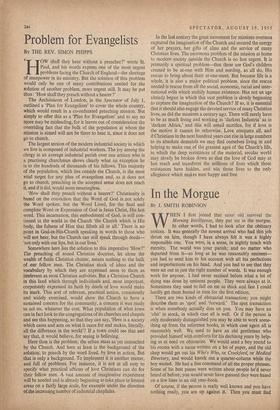Problem for Evangelists
By THE REV. SIMON PHIPPS OW shall they hear without a preacher?' wrote St. Paul, and his words express one of the most urgent problems facing the Church of England—the shortage of manpower in its ministry. But the solution of this problem would only be one of many contributions needed for the solution of another problem, more urgent still. It may be put thus : 'How shall they preach without a hearer?'
The Archdeacon of London, in the Spectator of July 1, outlined a 'Plan for Evangelism' to cover the whole country, which would result in a co-ordinated preaching mission. But simply to offer this as a 'Plan for Evangelism' and to say no more may be misleading, for it leaves out of consideration the overriding fact that the bulk of the population at whom the mission is aimed will not be there to hear it, since it does not go to church.
The largest section of the modern industrial society in which we live is composed of industrial workers. The joy among the clergy in an average industrial parish over one artisan who is a practising churchman shows clearly what an exception he is to the hundreds of thousands of his fellows. This majority of the population, which lies outside the Church, is the most vital target for any plan of evangelism and, as it does not go to church, preaching in the accepted sense does not reach it, and if it did, would seem meaningless.
`How shall they preach without a hearer?' Christianity is based on the conviction that the Word of God is pot solely the Word spoken, but the Word Lived, for the final and complete Word or Expression of God is Jesus Christ, His last word. This incarnation, this embodiment of God, is still con- tinued in the world in the Church 'the Church which is His body, the fulness of Him that filleth all in all.' There is no point in God-in-His-Church speaking in words to those who will not hear, but the Church can still speak through deeds— `not only with our lips, but in our lives.
Somewhere here lies the solution to this imperative 'How?' The preaching of sound Christian doctrine, let alone the wealth of futile Christian chatter, means nothing to the bulk of our fellow men. The Christian stock of ideas and the vocabulary by which they are expressed seem to them as irrelevant as most Christian activities. But a Christian Church in this land which through individuals and, most important, corporately expressed its faith by deeds of love would make its mark. This sort of relevant, practical action, consistently and widely exercised, would show the Church to have a sustained concern for the community, a concern it was ready to act on, whatever the cost. What population of what town can in fact look to the congregations of its churches and chapels and see this happening, so that they can say, 'Here is a society which cares and acts on what it cares for and makes, literally, all the difference in the world'? If a town could see that and say that, it would believe, for seeing is believing.
Here then is the problem; the urban mass as yet untouched by the Church. And here at least is the background of the solution; to preach by the word lived, by love in action. But that is only a background. To implement it is another matter, and full of problems. For instance, it is not at all easy to specify what practical actions of love Christians can do for their fellow men. A vast amount of imaginative experiment will be needed and is already beginning to take place in limited areas on a fairly large scale, for example under the direction of the increasing number of industrial chaplains. In the last century the great movement for missions overseas captured the imagination of the Church and secured the energy of her prayers, her gifts of alms and the service of many Christian lives. The enormous problem of the mission at home to modern society outside the Church is no less urgent. It is primarily a spiritual problem—that these are God's children created to be at-one with Him and needing, as all do, His rescue to bring about their at-one-ment. But because life is a whole, it is also a major political problem, since the rescue needed is rescue from all the social, economic, racial and inter- national evils which stultify human existence. Has not an age already begun in which this vast problem is slowly beginning to capture the imagination of the Church? If so, it is essential that it should also engage the devoted service of many Christian lives, as did the missions a century ago. There will surely have to be as much living and working in 'darkest Industria' as in `darkest Africa,' and this will entail sacrifice, for if love is the motive it cannot be otherwise. Love conquers all, and if Christians in the next hundred years can rise in large numbers to its absolute demands we may find ourselves living in and helping to make one of the greatest ages of the Church's life, in which the deep resistances of the material, secular world may slowly be broken down so that the lave of God may at last reach and transform the millions of lives which those resistances have hidden, and win those lives to the only allegiance which makes men happy and free.


































 Previous page
Previous page